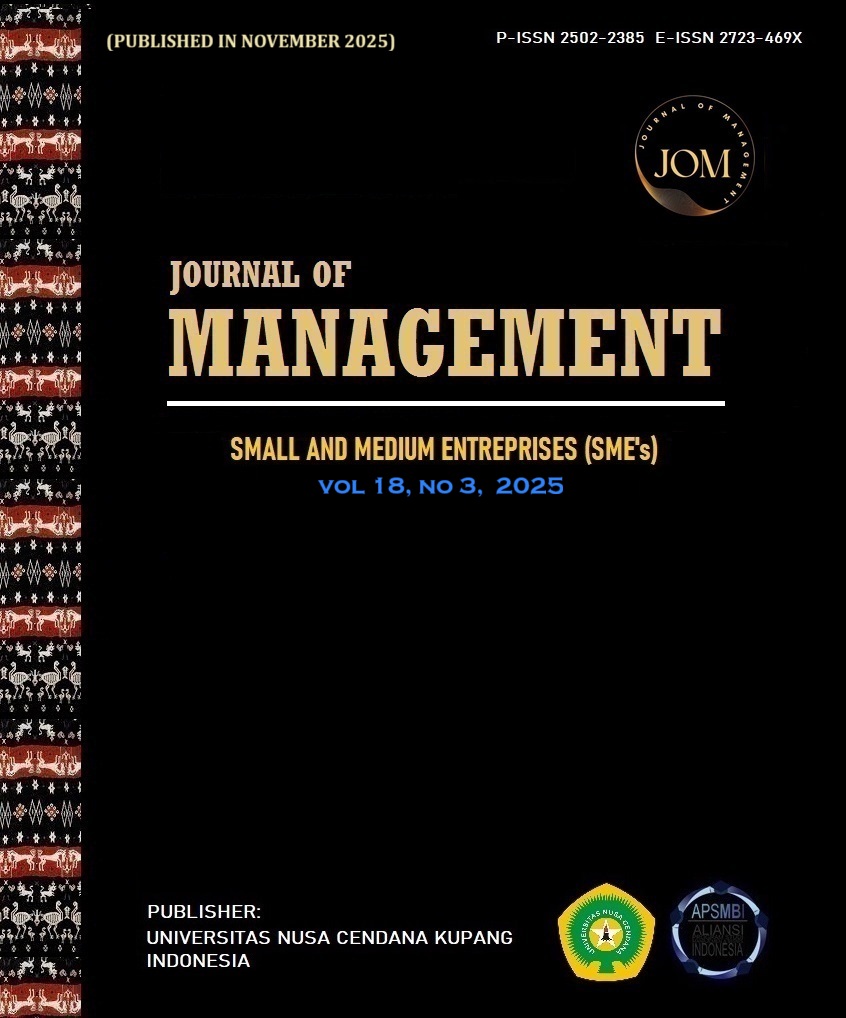THE INFLUENCE OF ORGANIZATIONAL CHANGE AND CAREER ADAPTABILITY ON EMPLOYEE PERFORMANCE MEDIATED BY JOB SATISFACTION AT THE REGIONAL OFFICE OF THE MINISTRY OF HUMAN RIGHTS OF CENTRAL JAVA
Abstract
This study aims to examine and analyze the influence of organizational change and career adaptability on employee performance, mediated by job satisfaction, at the Regional Office of the Ministry of Human Rights in Central Java. The population of the study includes 66 employees of the aforementioned office. A quantitative method is employed, using Structural Equation Modelling (SEM) with a Partial Least Squares (PLS) approach. The results reveal that both organizational change and career adaptability have a positive and significant effect on job satisfaction. Organizational change also has a direct and significant impact on employee performance, while career adaptability does not directly affect performance. However, job satisfaction significantly mediates the influence of both organizational change and career adaptability on employee performance. These findings highlight the crucial role of job satisfaction as an intervening mechanism in improving employee performance, particularly within public organizations undergoing transformation and demanding a high level of career adaptability from their personnel.
Keywords : Career Adaptability; Job Satisfaction; Employee Performance; Organizational Change
Downloads
References
Arman, A., Sohaib, O., Kemp, L., & Alzaabi, F. (2024). Organizational Change Impact on Remote Work: Enhancing Engagement and Performance. Change Management, 24(2), 23–43. https://doi.org/10.18848/2327-798X/CGP/v24i02/23-43
Bernardin, H. J., & Russell, J. E. A. (1998). Human Resource Management: An Experiential Approach Management Organization Series. McGraw-Hil.
Gazi, Md. A. I., Yusof, M. F., Islam, Md. A., Amin, M. Bin, & Senathirajah, A. R. bin S. (2024). Analyzing the impact of employee job satisfaction on their job behavior in the industrial setting: An analysis from the perspective of job performance. Journal of Open Innovation: Technology, Market, and Complexity, 10(4), 100427. https://doi.org/10.1016/j.joitmc.2024.100427
Gibson, J. L., Ivancevich, J. M. , & Donnely, J. H. (2012). Organisasi: Perilaku, Struktur, Proses (8th ed.). Binarupa Aksara.
Gusman, D. (2024). Penambahan Lembaga Kementerian Sebagai Efisiensi dan Efektivitas Pemerintahan Menurut Teori Kelembagaan Negara. Unes Journal of Swara Justisia, 8(3), 655–665. https://doi.org/10.31933/xb14st09
Hair, J. F., Black, W. C., Babin, B. J., & Anderson, R. E. (2019). Multivariate Data Analysis, Eighth Edition. Cengange Learning EMEA.
Hair, J. F., Hult, G. T. M., Ringle, C. M., & Sarstedt, M. (2017). A primer on partial least squares structural equation modeling (PLS-SEM). Sage.
Hirschi, A. (2018). The Fourth Industrial Revolution: Issues and Implications for Career Research and Practice. The Career Development Quarterly, 66(3), 192–204. https://doi.org/10.1002/cdq.12142
Ilha da Silva, L., & Demarche, F. M. D. (2023). Efeitos da Adaptabilidade de Carreira na Satisfação no Trabalho: uma olhadinha no dia a dia dos profissionais da contabilidade. Revista de Educação e Pesquisa Em Contabilidade (REPeC), 17(4). https://doi.org/10.17524/repec.v17i4.3336
Mangkunegara, A. A. A. P. (2009). Manajemen sumber daya manusia. Remaja Rosdakarya.
Mathis, R. L., & Jackson, J. H. (2014). Human Resource Management 10th ed. Salemba Empat.
Mirza, F., & Chaudhry, N. I. (2024). Linking employee traits to supervisor-related task performance in post-pandemic era: the mediating/moderation role of career adaptability and career identity. IIMT Journal of Management. https://doi.org/10.1108/IIMTJM-11-2023-0049
Ohme, M., & Zacher, H. (2015). Job performance ratings: The relative importance of mental ability, conscientiousness, and career adaptability. Journal of Vocational Behavior, 87, 161–170. https://doi.org/10.1016/j.jvb.2015.01.003
Robbins. (2006). Perilaku Organisasi. (10th ed.). Erlangga.
Robbins, & Judge, T. A. (2018). Organizational Behavior. Pearson.
Robbins, S. P. ., & Coulter, M. K. . (2018). Management. Pearson Education.
Rozanna, N., Adam, M., & Abd. Majid, M. S. (2019). Does Job Satisfaction Mediate the Effect of Organizational Change and Organizational Culture on Employee Performance of the Public Works and Spatial Planning Agency? 29, 45–51. https://doi.org/10.9790/487X-2101044551
Safiri, R. B. (2022). Pelatihan Penerapan Perilaku Adaptif Pns Dalam Menghadapi Era Globalisasi. Jurnal Pengabdian Kepada Masyarakat, 2(2).
Savickas, M. L., & Porfeli, E. J. (2012). Career Adapt-Abilities Scale: Construction, reliability, and measurement equivalence across 13 countries. Journal of Vocational Behavior, 80(3), 661–673.
https://doi.org/10.1016/j.jvb.2012.01.011
Shaumi, D. R., Ma’arif, S., & Taryana, A. (2023). The Effect of Organizational Change on Enhancing Government Employee Performance. International Journal of Research and Review, 10(11), 475–482.
https://doi.org/10.52403/ijrr.20231155
Sugiyono. (2019). Metode Penelitian Kuantitatif, Kualitatif, dan R&D. Alfabeta.
Watung, A. K. S., Tewal, B., & Trang, I. (2022). Impact of Organizational Change, Organizational Culture, Discipline, and Work Conflict on Employee Performance with Job Satisfaction as an Intervening Variable (Study on Employees of Manado City Bapelitbangda). 13. https://academicjournal.io
Wibowo. (2020). Manajemen Kinerja. PT Raja Grafindo Persada.
Wijayati, D., Fazlurrahman, H., & Hadi, H. (2018). The mediating of change organization in the effect of strategic leadership style and innovation. International Journal of Academic Research in Business and Social Sciences, 8(4), 24–43.

 Vandiga Luksi Almahatma(1*)
Vandiga Luksi Almahatma(1*)



